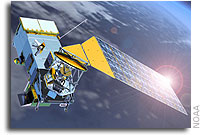Testimony on Polar-Orbiting Operational Environmental Satellites by David A. Powner

Testimony on Polar-Orbiting Operational Environmental Satellites by David A. Powner, director, GAO information technology management issues, before the Subcommittee on Energy and Environment, House Committee on Science and Technology.
What GAO Found
The NPOESS program office has made progress in restructuring the acquisition by establishing and implementing interim program plans guiding contractors’ work activities in 2006 and 2007; however, important tasks remain to be done. Executive approvals of key acquisition documents are about 9 months late—due in part to the complexity of navigating three agencies’ approval processes. Delays in finalizing these documents could hinder plans to complete contract negotiations by July 2007 and could keep the program from moving forward in fiscal year 2008 with a new program baseline.
The program office has also made progress in establishing an effective management structure by adopting a new organizational framework with increased oversight from program executives and by instituting more frequent and rigorous program reviews; however, plans to reassign the recently appointed Program Executive Officer will likely increase the program’s risks. Additionally, the program lacks a process and plan for identifying and filling staffing shortages, which has led to delays in key activities such as cost estimating and contract revisions. As of June 2007, key positions remain to be filled.
Development and testing of major NPOESS segments—including key sensors and ground systems—are under way, but significant risks remain. For example, while work continues on key sensors, two of them—the visible/infrared imager radiometer suite and the cross-track infrared sounder—experienced significant problems and are considered high risk (see table). Continued sensor problems could cause further cost increases and schedule delays. Additionally, while progress has been made in reducing delays in the data processing system, work remains in refining the algorithms needed to translate sensor observations into usable weather products. Given the tight time frames for completing this work, it will be important for program officials and executives to continue to provide close oversight of milestones and risks.








